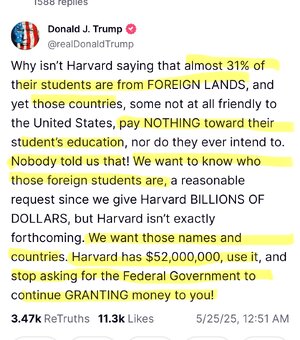- Messages
- 4,242
Many who would stay here and do great things....................I can't begin to describe the level of cruelty of this action. Lots of international students are innocent bystanders in this squabble.
Follow along with the video below to see how to install our site as a web app on your home screen.
Note: This feature may not be available in some browsers.
Many who would stay here and do great things....................I can't begin to describe the level of cruelty of this action. Lots of international students are innocent bystanders in this squabble.
We're just winning friends left and right under Dear Leader! Seriously, I think long-term we're going to pay a terrible price for alienating nearly all of our traditional allies. And maybe sooner rather than later.
Future queen of Belgium caught up in Harvard foreign student ban — Reuters
Princess Elisabeth, the 23-year-old future queen of Belgium, has just completed her first year at Harvard University but the ban imposed by U.S. President Donald Trump's administration on foreign students studying there could jeopardise her continued studies.apple.news

Future queen of Belgium caught up in Harvard foreign student ban — Reuters
Princess Elisabeth, the 23-year-old future queen of Belgium, has just completed her first year at Harvard University but the ban imposed by U.S. President Donald Trump's administration on foreign students studying there could jeopardise her continued studies.apple.news
Isn't that an oxymoron?Permanent preliminary injunction incoming.
As Rick Perry famously said, "oops."Isn't that an oxymoron?
Trump is nothing if not an extremely petty, vindictive little shit, so this certainly fits. I'm also sure that he's had guys like Chris Rufo and Stephen Miller in his ear telling him that this is probably the GOP's last great chance to destroy liberalism at American universities by ending diversity initiatives and gaining control of their curriculum and policies and forcing them to move to the right. Dark days indeed for American education at all levels.
Because having presidential administrations literally force universities to cater to their whims via cutting funding, and threatening their existence by such measures as cutting off their supply of international students, and dictating their policies is a perfectly acceptable way to do business. In reality, and despite Vance's claims, this is no different from the mob forcing business owners to bow to their demands via extortion, and is also exactly what Viktor Orban - one of the right's favorite dictators - did in Hungary to his nation's universities and schools.

We bought it… Nov 2024. Enjoy!We're just winning friends left and right under Dear Leader! Seriously, I think long-term we're going to pay a terrible price for alienating nearly all of our traditional allies. And maybe sooner rather than later.
